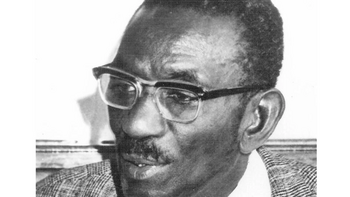More languages
More actions
Cheikh Anta Diop (29 December 1923 – 7 February 1986) was a Senegalese historian, anthropologist, physicist, and pan-african political leader. [1]
Cheikh Anta Diop | |
|---|---|
 Cheikh Anta Diop | |
| Born | December 29, 1923 Diourbel Region,Senegal |
| Died | February 7, 1986 Dakar, Senegal |
| Nationality | Senegal |
| Known for | The African Origin of Civilization: Myth or Reality, Civilization or Barbarism: an authentic anthropology, Black Africa: the economic and cultural basis for a federated state , Precolonial Black Africa, The Cultural Unity of Black Africa: The Domains of Patriarchy and of Matriarchy in Classical Antiquity |
| Field of study | History, Anthropology |
Diop's work is considered foundational to Afrocentric Historiography and Afrocentricity more broadly[2]. The questions he posed about cultural bias in scientific research and colonial historiography contributed greatly to the "postcolonial" turn in the study of the history and structures of African civilizations away from the european and colonial conceptions, mostly through his studies of Ancient Egypt.[3] This is sometimes referred to as Diopian Historiography.[4]. Cheikh Anta Diop advanced multiple theories, including the Two Cradle Theory[5], African Matriarchy, and Egypt as a black civilization[4].
Cheikh Anta Diop University (formerly known as the University of Dakar), in Dakar, Senegal, is named after him.[6] The African Renaissance movement was founded in the early 1990s by Théophile Obenga and Cheikh M'Backe Diop to expand upon the ideas of Cheikh Anta Diop. The Cheikh Anta Diop International Conference was initiated by Molefi Kete Asante to coincide with the introduction of the first doctoral program in African American Studies at Temple University, first held in October 1988.[4]
Biography
Politics
Work and Thought
Influence and Reception
References
- ↑ Anna Micklin (2008-06-14). "Cheikh Anta Diop (1923-1986)" BlackPast.org. Retrieved 2023-08-07.
- ↑ Ana Monteiro-Ferreira (2014). The Demise of the Inhuman: Afrocentricity, Modernism and Postmodernism (p. 6). Albany: State University of New York Press. [LG]
- ↑ Bryson Gwiyani-Nkohma (2006). Towards an African historical thought: Cheick Anta Diop's contribution. Journal of Humanities, Vol 20, No.1.
- ↑ 4.0 4.1 4.2 Molefi Kete Asante and Ama Mazama (2005). Encyclopedia of Black Studies. Thousand Oaks: Sage Publications. [LG]
- ↑ Troy D. Allen (2008). Cheikh Anta Diop's Two Cradle Theory: Revisited (pp. 813-829). Journal of Black Studies, Volume 38, Nr.6. doi: 10.2307/40035025 [HUB]
- ↑ Malenn-Kegni Toure (2009-02-08). "Cheikh Anta Diiop University (1957–)" blackpast.org. Retrieved 2023-08-07.
